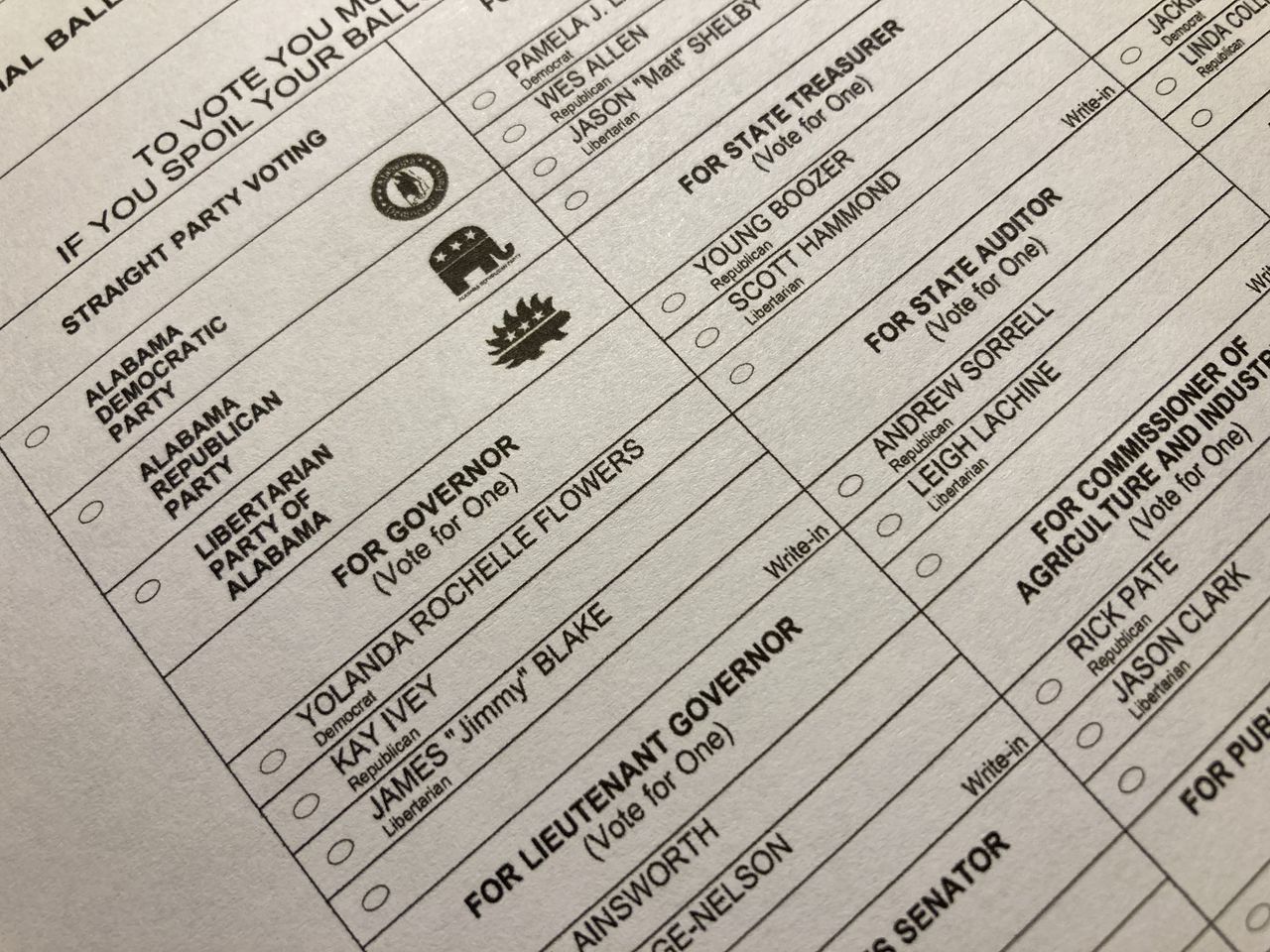Election 2022: Alabama Libertarians look to play spoiler, win ballot retention
It’s been 20 years since John Sophocleus played the role of spoiler in the 2002 Alabama governor’s race that ushered in an era of Republican dominance in the state’s top elected office.
Sophocleus, a Libertarian, received 23,272 votes, or enough to have made a difference in the razor-thin outcome that saw Republican Bob Riley defeat Democratic incumbent Gov. Don Siegelman by 3,100 votes.
Related:
Two decades later, Sophocleus, 60, of Beauregard, returns to the ballot as does the Libertarian Party. This time around, he’s running for the U.S. Senate. But unlike 2002, Alabama is a deep red state where Republicans are expected to roll to victory in all statewide contests.
What does victory look like for Sophocleus and the Libertarians in 2022?
In short, achieving 20% of the vote in one of the statewide contests that will allow the third-party to field candidates during the 2024 election. The possibilities include Lieutenant Governor, Commissioner of Agriculture and Industries, Auditor, Treasurer, and Public Service Commission (Places 1 and 2).
“There are a lot of people who are fed up with the duopoly,” Sophocleus, a retired economics professor, said.
‘Cautiously optimistic’
Dr. Jimmy Blake, a retired physician living along the Black Warrior River, is running as the Libertarian Party’s candidate for governor in 2022. It’s the first time the former Birmingham City Councilman has run for public office in over 20 years. (supplied photo).
The Libertarian Party, which stands for limited government involvement on social and economic matters, will have approximately 60 candidates running for offices throughout the state.
The party will also have a candidate running for all of the statewide races. In the races which Democrats are not fielding any candidates – there are six statewide, including lieutenant governor, auditor, and the public service commission – Libertarians are hoping to achieve 20% of the vote. That threshold must be met for the party to have ballot access in 2024, without having to gather tens of thousands of signatures from Alabama voters like it did this election cycle.
“I am feeling good about that,” said Dr. Jimmy Blake, 71, the Libertarian candidate for governor who is running against Republican incumbent Gov. Kay Ivey – the heavy favorite to win re-election – and Democratic opponent Yolanda Flowers.
“The Democrats do not have a lieutenant governor candidate,” said Blake, a former member of the Birmingham City Council who is running in his first political contest in over 20 years. “We have Ruth Page-Nelson who is running and other people who just running against a Republican for statewide office and any one of them or me or John Sophocleous can get the 20 percent to meet the goal.”
He added, “I feel cautiously optimistic about it.”
Sophocleus, a retired economics instructor at Auburn University, said the party is looking at Page-Nelson’s run for lieutenant governor as the possible inroad toward achieving the 20%. He said he believes Page-Nelson, 60, of Dothan, can get close to breaking the 20% threshold against incumbent Lt. Gov. Will Ainsworth.
Page-Nelson, however, said she’s in the race to win it. She is running on a platform of criminal justice reform, ending corruption in state government, and utilizing the office to forward legislation to the Alabama Senate aimed at improving education and health care.
“I was enticed into this,” said Page-Nelson, who has been active with Dothan For Justice Now, a group that fights racial injustices. “There was no Democrat running. And the representation of women and people of color and criminal justice reform, those are (issues) that are not on the table with the existing incumbents. I saw this as an opportunity for representation to be spread and having the Libertarian Party on the ballot gives us a more fair shake here in Alabama.”
Straight ticket voting

A sample of the 2022 general election ballot in Alabama. Straight ticket voting is at the top of the ballot. (John Sharp/[email protected]).
To come close to winning any of the races, or to get the 20% threshold in one of the statewide contests, the Libertarian Party will have to overcome a disadvantage in straight-party voting.
Alabama is one of only six states in the U.S. with the option of voting for a political party atop the ballot, and then having all of that party’s candidates receive a vote without the voter having to go through the rest of the ballot.
Republicans will be the biggest beneficiary, according to recent polling by Cygnal on behalf of Alabama Daily News and Gray Television. Of those survey, 53.4% of voters plan to vote straight-ticket Republican on November 8, while 24.4% will vote straight-ticket Democrat. Only 2.3% of voters say they plan to vote straight-ticket Libertarian.
Page-Nelson said she is most upset with Democratic leadership in Alabama for encouraging their voters to cast a straight-ticket ballot when a half-dozen of Alabama’s statewide contests do not have a Democratic candidate to choose. Randy Kelley, the new chairman of the Alabama Democratic Party, recently said he is encouraging straight-party voting.
“You can’t simply think you are block voting without being responsible enough to find out that those two spaces you are seeing on the ballot are in six races with only Libertarian and Republicans,” Page-Nelson said. “The Republicans have a candidate in every race, but the Democrats are missing.”
She added, “My message to the Democratic Party is you want laws to change (in Alabama) you need to go down the ballot and vote for me.”
Libertarians have a disadvantage against Republicans in fundraising, but in some races, they are on par or are performing better in fundraising than the Democrats. In the race for governor, for instance, Blake has raised over $25,000 to Flowers’ $11,845.
Blake said he blames Flowers’ gubernatorial candidacy for simply making it more difficult for the Libertarian Party to receive enough votes for ballot retention. He believes the state Democrats and Republicans are “colluding” against the Libertarians.
Kelley, the state Democratic Party chairman, said he’s unfamiliar with the Libertarian Party, but added that “I’m a Democrat and I am encouraging people to vote straight Democrat.”
Restrictive access
Libertarians already accomplished something rare for a third party in Alabama: It got its candidates on the ballot to begin with.
Alabama has one of the most restrictive ballot access laws in the nation and is viewed by national scholars as unfavorable toward third parties.
The 20% standard has been in place since 1982 and is by far the most restrictive in the nation. According to Richard Winger of Ballot Access News, the median ballot retention requirement among states in the U.S. is 2%.
It was costly for the Libertarian Party to gather up the signatures to even appears on the November 8 ballot. The cost was $250,000, an amount that was mostly paid for by the national Libertarian Party as an effort to bolster the party’s ballot presence.
Sophocleus says the party was frustrated over the timing of gaining ballot access. The effort took two years, and ended up in amassing 80,000 signatures, which comfortably cleared the minimum threshold of 51,588 to gain statewide ballot access, or 3% of the total votes during the 2018 elections. That was the last time there was a governor’s race in Alabama.
He said the party first learned it would be granted ballot access in late May and it did not leave the Libertarian Party enough time to recruit more candidates to run.
“Secretary (of State John) Merrill would not tell us we had ballot access in a timely manner,” Sophocleus said. “It’s amazing we rounded up 60 candidates when we did. You devote a quarter-million dollars and time and money and effort to even get on the ballot. Wouldn’t it be nice to have those resources to devote to a serious campaign during a normal campaign cycle?”
Merrill said he felt his office did an extraordinary job of verifying the number of signatures that were filed earlier this year. It was the first time a political party since 2002, aside from Republicans and Democrats, fielded enough signatures to earn a spot on the general election ballot.
“We have six people who work in the elections division, and they had to verify 80,000 signatures (gathered by the Libertarians) against the signatures we have on file,” said Merrill, a Republican. “I don’t know what he would consider in a timely fashion, but I can tell you in the period of time we had to do that, and all of the other responsibilities assigned to those six people who work in that division of that office, I would say they have done an extraordinary job of confirming those signatures and ensuring ballot placement for the Libertarian Party.”
Party platforms
The party has spent what little time and money it has had this year on educating the public about its positions.
Blake argues that Republicans are less conservative on monetary issues than Libertarians and blasted them for not taking a small government approach toward taxes. He calls plans for the state to build new prisons “stupid,” and accuses the GOP of betraying Alabamians who expect the party to operate with “small government” principles.
Libertarians support policies that defend individual rights and are supportive of gun right protections often championed by Republican conservatives. But the party is also critics over what they view as a failed “War on Drugs” and back the legalization of marijuana.
Libertarians also support trade policies that seek diplomacy rather than nation-building, and champion civil liberties and privacy rights. They mostly splinter from Alabama Republicans on views about abortion. Libertarians, in general, do not want the government regulating choice.
The party is also unafraid at looking for areas of major reform.
Sophocleus, who said that GOP Senate hopeful Katie Britt is afraid to debate him, said he supports a measure to expand the U.S. House from its current number of 435 voting representatives to around 1,300 members. He said the population figures to determine the size of the U.S. House were determined in 1929, noting that the country’s population has tripled since then.
“Understand the problems that result from that,” said Sophocleus. “The hyper gerrymandering. We have one representative for every 700,000 residents. Who in their right minds think that is representative government?”
He said with an expanded number of U.S. House members, “lobbyists would not spend a lot of money to buy a vote.”
“I think a lot of the problems would be resolved if we have this representative government against instead of an oligarch,” Sophocleus said.
Spoiler role
Jess Brown, a retired political science professor at Athens State University and a longtime observer of Alabama state politics, said the chances of Sophocleus or other statewide Libertarians playing the role of spoiler are slim.
He said that Libertarians could play more of a spoiler role in down ballot contests such as the race to replace Republican Rep. Mike Ball in State House District 10 in North Alabama. The candidates in that closely watched race include Republican David Cole, Democrat Marilyn Lands and Libertarian Elijah Boyd.
“If there is a low turnout, you might look and see where a Libertarian took 4 percentage points away from a Republican,” said Brown.
But he said the Alabama Libertarians do not have the mechanism to make a difference in the statewide contests.
“It’s the age-old problem with third parties,” Brown said. “They get a little traction and media attention, but the typical voter will say, ‘they won’t win’ or ‘I’m tossing my vote away with them.’”
